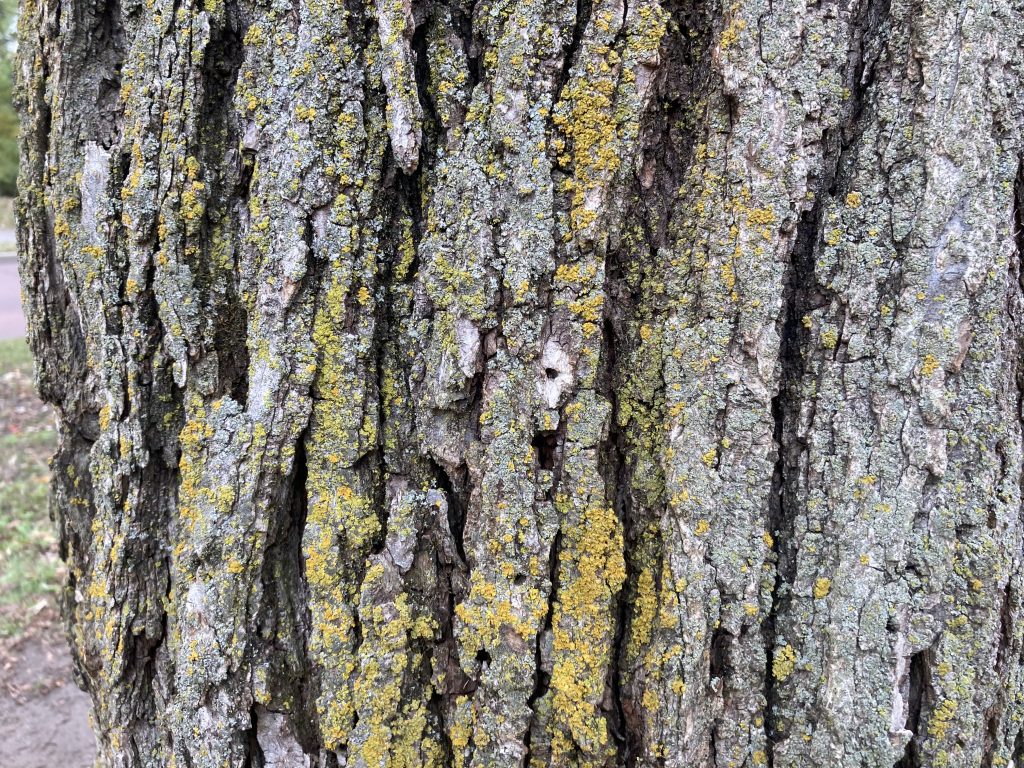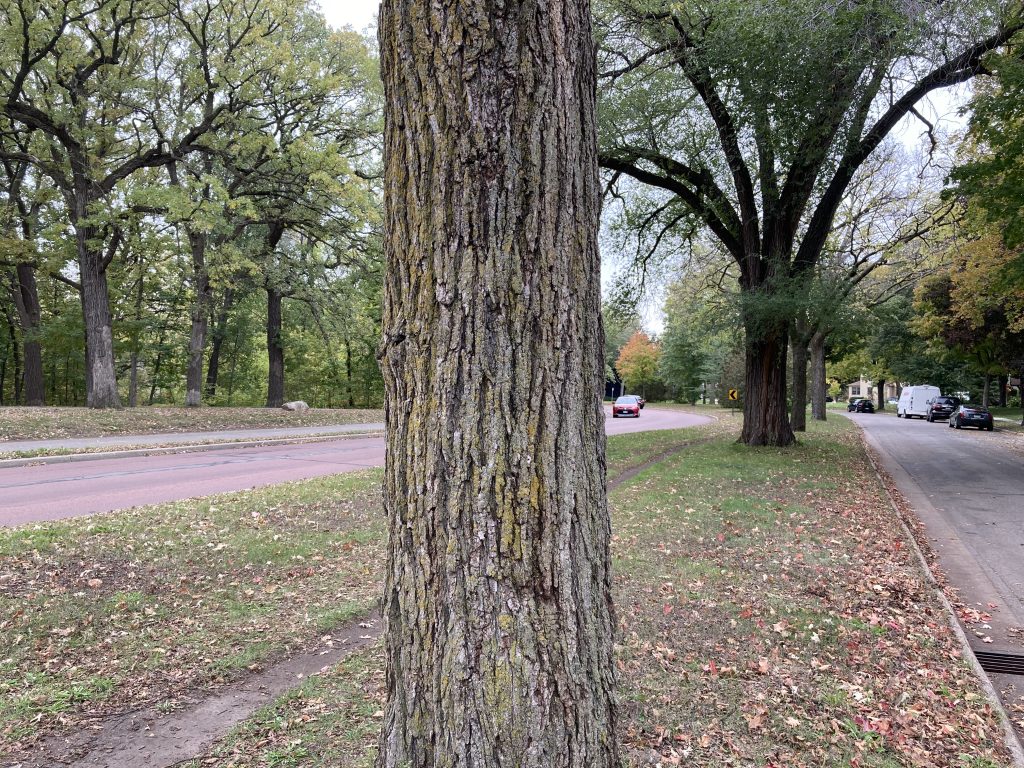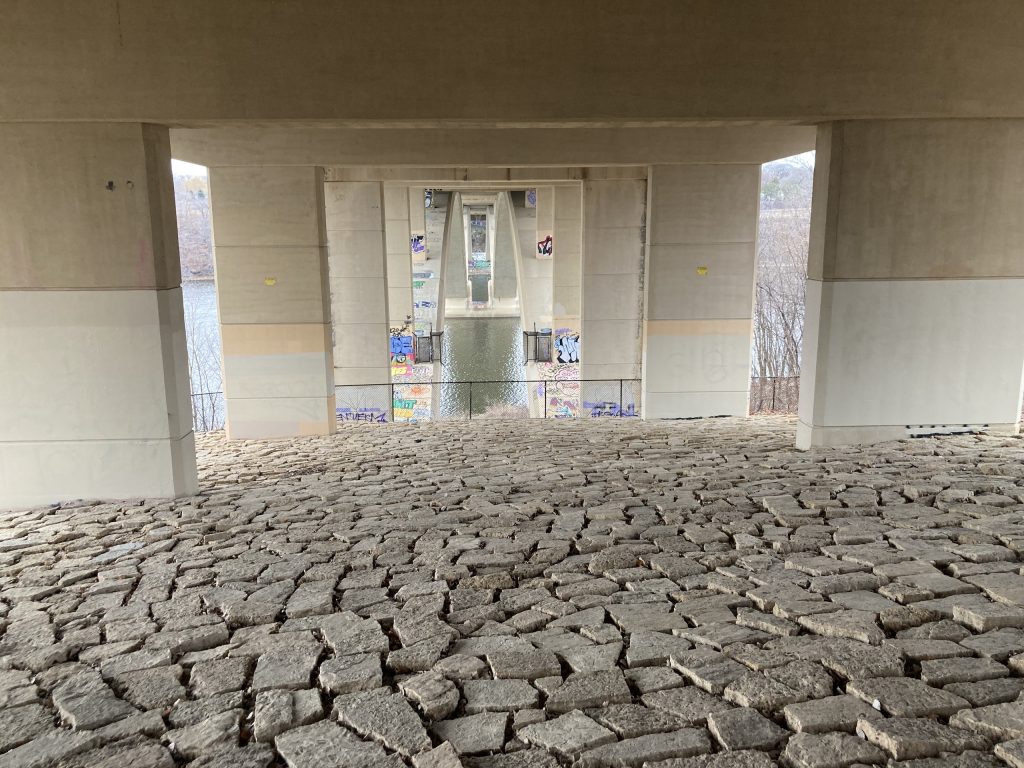4 miles
minnehaha falls and back
45 degrees
Felt a little heavy and slow today, but happy to be outside, running.
10 Things
- wild turkeys! — 2: one on a narrow strip of grass between the paved trail and the road, the other deep in the small stretch of woods near the ford bridge, both quiet and unbothered by my presence
- the falls falling — a gush of white, more than a shimmer, less than a roar
- imagining the ancient swing of my arms, like a pair of scissors cutting the air — I listened for the sharp swish of blades and almost heard it
- running beside a squirrel, wary, wondering if it would dart out in front of me (no)
- a strange looking bike propped against the bench at folwell — had to stare to make sense of it — a bike with a makeshift trailer?
- black-capped chickadee fee bee
- the scratching noise of a leaf skittering against the curb repeatedly
- a runner in hot pink shoes and a kelly green vest — hello 80s!
- my breath, underneath the silence
- the roar of kids having fun on the playground at Dowling
Silence
Before the run, discovered Paul Goodman’s Nine types of Silence via Brain Pickings today.
Not speaking and speaking are both human ways of being in the world, and there are kinds and grades of each. There is the dumb silence of slumber or apathy; the sober silence that goes with a solemn animal face; the fertile silence of awareness, pasturing the soul, whence emerge new thoughts; the alive silence of alert perception, ready to say, “This… this…”; the musical silence that accompanies absorbed activity; the silence of listening to another speak, catching the drift and helping him be clear; the noisy silence of resentment and self-recrimination, loud and subvocal speech but sullen to say it; baffled silence; the silence of peaceful accord with other persons or communion with the cosmos.
9 Types of Silence (Goodman)
- the dumb silence of slumber or apathy
- the sober silence that goes with a solemn animal face
- the fertile silence of awareness, pasturing the soul, whence emerge new thoughts
- the alive silence of alert perception, ready to say, “This… this…”
- the musical silence that accompanies absorbed activity
- the silence of listening to another speak, catching the drift and helping him be clear
- the noisy silence of resentment and self-recrimination, loud and subvocal speech but sullen to say it
- baffled silence
- the silence of peaceful accord with other persons or communion with the cosmos.
Paul Goodman’s name sounded familiar, so I looked through my past blogs to see if I had written about him. I had: Paul Goodman, troublemaking role model? According to this post, I watched a documentary about him that I don’t remember watching. The link in this post no longer works, but I can watch it on Kanopy through my library if I want to — do I?
There’s the still silence of the Farm’s front 40 field; the cocooned silence of the Downtown Minneapolis Library’s parking garage; the fleeting silence of the river road, briefly emptied of cars or bikes or people.
from 29 march 2017: 3 ruminations on silence (with one of my first poems) — silence is easily broken, deafening, impossible, uncomfortable
a silence in which
another voice may speak (Praying/ Mary Oliver)
As all the Heavens were a Bell,
And Being, but an Ear,
And I, and Silence, some strange Race
Wrecked, solitary, here –
(I felt a Funeral in my Brain”/ Emily Dickinson
Accept what comes from Silence.
Make the best you can of it.
Of the little words that come
out of the silence, like prayers
prayed back to the one who prays,
make a poem that does not disturb
the silence from which it came
(How to be a Poet/ Wendell Berry)
The world is filled with music, and in between the music, silence
And varying the silence all sorts of sounds, natural and man made
(Hymn to Life/ James Schuyler)
I thought about silence while I ran, listened for silence, stayed silent the entire time — that is, if I take Goodman’s understanding that silence = not speaking. I smiled, I breathed, my feet struck the ground — not all of me was silent. I struggled to remember Berry’s little poem that mentions silence and thought about not wanting to disturb the silence from which it came. I imagined ripples and wondered how big they’d have to be to count as disturbing the surface. Then I thought about Audre Lorde and her essay, “The Transformation of Silence into Language” and when speaking is urgent and necessary.
question mark
the length of silence
after a loon’s call
(Birds Punctuate the Days/ Joyce Clement)
listen to the horrible keep-time of a man walking,
rustling and jingling his keys
at the centre of his own noise,
clomping the silence in pieces
(Dart/ Alice Oswald)
You probably think I’m nuts saying the mountains
have no word for ocean, but if you live here
you begin to believe they know everything.
They maintain that huge silence we think of as divine,
a silence that grows in autumn when snow falls
slowly between the pines and the wind dies
to less than a whisper and you can barely catch
your breath because you’re thrilled and terrified.
(Our Valley/ Philip Levine)
added on 11 march 2024:
These be
Three silent things:
The falling snow. . the hour
Before the dawn. . the mouth of one
Just dead.
(Triad/ Adelaide Crapsey)
one final silence (for today’s entry): data silence
When I read through the entry that I posted about Goodman on my TROUBLE blog, I found a link to one of my favorite ed-tech troublemakers from when I was still angry about the academic industrial complex and still trying to figure out how to position myself in relation to it: Audrey Watters. I read her new about page and found out that she isn’t writing about tech-ed anymore and has instead become: a multi-sport athlete. Wow! Very cool. She also writes about “health technologies and Silicon Valley’s obsession with engineering bodies and minds” on Second Breakfast. I’m excited to read what she thinks about all of this. For more than a year, I’ve had passing thoughts about my Apple watch and whether or not I should keep wearing it. Earlier this week, after feeling uncomfortable anxiety over a resting heart rate that was a little higher than normal, and had been for several days, I wondered, why is this small change in my heart rate bothering me so much? And, should I really be tracking it this closely? No. So I decided to not wear my watch right after getting up, and not until I went out for a run. The next step is probably to ditch the watch altogether, but I’m not sure if I’m ready for that . . . yet. Anyway, I’m looking forward to reading AW’s takes on “wearables” and health-tech. Increasingly, I’m thinking I’d like to move towards data silence.


